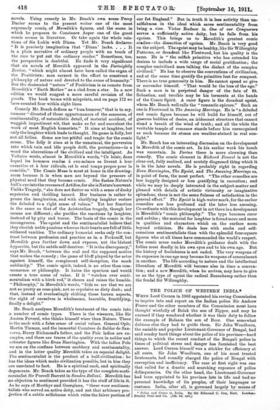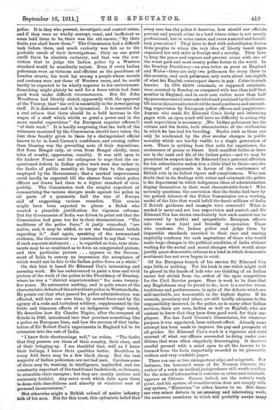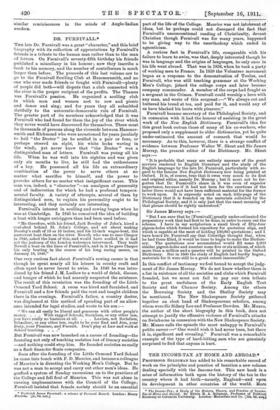THE POLICE OF WESTERN INDIA.* WHEN Lord Curzon in-1903 appointed
his roving Commission to inquire into and report on the Indian police Sir Andrew Fraser and the other members of the Commission must have thought' wistfully of Balak the son of Zippor, and may be excused if they wondered whether it was their duty to follow the example of Balaam the son of Beer. One somewhat dubious clue they bad to guide them. Sir John Woodburn, the amiable and popular Lieutenant-Governor of Bengal, had said sundry hard things about the police of his province—bard things to which the recent conduct of the Bengali police in times of political stress and danger has furnished the best answer•. Lord Curzon himself was a stickler for efficiency at all costs. Sir John Woodburn, one of his most trusted lieutenants, had roundly charged the police of Bengal with corruption and inefficiency. The case at first sight was one that called for a drastic and searching exposure of police delinquencies. On the other hand, the Lieutenant-Governor had been appointed to his province late in life and had no personal knowledge of its peoples, of their languages or customs. India, after all, is governed largely by means of • Police and Crime in India. By Sir Edmund. C. Cor, Bart. London: Stanley Paul and Co. L12a. 6d. net.]
police. It is they who prevent, investigate, and control crime, and if they were so wholly corrupt, venal, and inefficient- as some held them to be, there was the old answer, "By their fruits you shall know them." The Commission had a difficult task before them, and much curiosity was felt as to the probable result of their investigations. Only on one point could there be absolute certainty, and that was the con- viction that to judge the Indian police by a Western standard would be manifestly unjust. Even if every Indian policeman were as virtuous and efficient as the guardians of London streets, his work lay among a people whose morals and customs were not those of Western races, and he could hardly be expected to be -wholly superior to his environment. Something might plainly be said for a force which had dene good work under difficult circumstances. But Sir John Woodburn had bluntly stated, apparently with the approval of the Viceroy, that " the evil is essentially in the investigating staff. It is dishonest and it is tyrannical. It is essential for a real reform that there should be a bold increase in the wages of a staff which wields so great a power and in the more careful supervision" (by European superior officers P) " of their work." It is hardly surprising that the bulk of the witnesses examined by the Commission should have taken the hint thus frankly given to them by a distinguished official known to be in Lord Curzon's confidence, and cursing rather than blessing was the prevailing note of their depositions. Not from Bengal only, or even from Bengal chiefly, came tales of cruelty, oppression, venality. It was still open to Sir Andrew Fraser and his colleagnes to urge that the un- questioned defects in Indian police work were due rather to the faults of public morality at large than to the agency employed by the Government; that a marked improvement could hardly be expected till the classes from which police Officers are drawn had risen to a higher standard of civic probity. The Commission took the simpler expedient of summarizing the various charges made against the police in all parts of a peninsula half the size of Europe and of suggesting various remedies. This course might have been expected to please a Balak who wanted a plausible justification for vigorous reforms. But the Government of India was driven to point out that the Commission had gone too far in their denunciations. "The traditions of the police force," it justly remarked, "are native, and, it may be added, so are the traditional beliefs regarding it." And again, speaking of the summarized evidence, the Government was constrained to say that " even if each separate statement . . . is regarded as true, true state- ments may be so combined as to form an exaggerated_picture, and this particular picture . • . appears to the Govern- ment of India to convey an impression the acceptance of which would not be fair to the Indian police force as a whole."
On this hint is based Sir Edmund Cox's interesting and amusing work. He has endeavoured to paint a true and vivid picture of the work of the police in the Presidency of Bombay, where he was a " district superintendent " for some twenty- five years. He extenuates nothing, and is quite aware of the characteristic defects of the subordinatepolice in Western India. He points out that what passed for police administration was effected, well into our own time, by armed force and by the agency of a rude and turbulent soldiery, supplemented by the futile and timorous efforts of an indigenous village watch. He describes how Sir Charles Napier, after the conquest of Scinde in 1843, introduced into that province something like a police on European lines, and how the success of that imita- tation of Sir Robert Peel's experiments in England led to its extension into the rest of India.
"I know their shortcomings well," he writes. " The faults that they possess are those of their country, their class, and of their bringing-up. I am thankful that, well as I know their failings, I know their qualities better. Doubtless in every fold there may be a few black sheep. But the vast majority of Indian policemen are not bad men. Careless some of them may be, wanting in intelligence, neglectful, and too constantly expectant of the traditional backsheesh, or doucenr, to stimulate their energies ; but they are mostly zealous and eminently faithful. Any extra work which falls upon them is done-with cheerfulness and alacrity at whatever cost of personal inconvenience."
Not otherwise might a British colonel of native infantry talk of his men. But for this trust, this optimistic belief that every race has the police it deserves, how should our officials prevent and punish crime in a land -where crime is not merely profesaional, but in some castes and races a sacred and heredi- tary possession ? They have to deal with subordinates drawn from peoples to -whom the very idea of liberty based upon• organized law and order is foreign and a novelty. They have- to keep the peace and repress and prevent crime with one of the worst paid and most scanty poliee forces in the world. In the Bombay Presidency—an area twice as great as England and Wales—there are only two policemen for every three in this country, and each policeman only costs about one-eighth of what his English counterpart draws in pay. Crime is much heavier. In 1885 43,000 criminals, or supposed criminals, were arrested in Bombay as compared with less than half that number in England, and in each case rather more than half the persons arrested were convioted and punished by the Courts. Of course these results involved the most assiduous and unremit- ting supervision by European police officers and magistrates. Anyone who reads Sir Edmund Cox's lively and informing pages with an open mind will have no difficulty in seeing why such supervision is necessary. ,The Indian policeman has his• virtues and his faults, both characteristic of the civilization in which he has had his breeding. Faults such as these can only be eradicated by the slow secular changes in public morality which are hardly visible to a single generation of men. There is nothing here that calls for impatience, for exuberance of praise or blame. Such manifest faults as there are in the rank and file of the Indian police—and we may be permitted to suspect that Sir Edmund Cox's paternal affection for his subordinates makes him a little kind to these—are the strongest of arguments in favOur of the continuance of British rule in its fullest vigour and completeness. Who can doubt that in its dealings with crime and criminals the police is the department in which indigenous ideas of administration display themselves in their most characteristic form P Who seriously questions the conviction that the faults laid bare by the patient labours of the Police Commission are a working model of the fate that would befall the dumb millions of India. if British guidance and exa.avple were removed ? What is needed is more and not less supervision and control, and Sir Edmund Cox has shown conclusively how such control can be converted by tactful and sympathetic European officers into the most loyal and friendly co-operation. Those who condemn the Indian police and judge them by impossible standards unsuited to their race , and rearing implicitly condemn the rash aspirations of those who would make huge changes in the political condition of India without waiting for the social and moral changes which would alone justify quasi-democratic reforms in a land in which democratic sentiment has not even begun to exist.
Of the European branch of his service Sir Edmund Cox says little or nothing. Yet his book is one which might well be placed in the hands of lads who are thinking of an Indian career but shrink from the ordeal of the open competition for the Civil Service proper. Here is work to be done that any Englishman may be proud to do; here is a service whose traditions and performances, in spite of the defects which are still inevitable, are honourable in the highest degree. If its rewards, pecuniary and other, are still hardly adequate to the responsibility incurred, in the police, as in many other Indian services, there are men, Indian as well as English, who are content to know that they have done good work for their em- ployers. Nor has Lord Curzon's Commission, for whatever purpose it was appointed, been without effect. Already some attempt has been made to improve the pay and prospects of all grades. Sir Edmund Cox's work is a vigorous and vivid account of what our officers succeeded in doing under con- ditions that were often singularly discouraging. It deserves careful perusal with a mind open to all the lessons to be learned from the facts impartially recorded in its pleasantly written and very readable pages.
There are one or two unimportant slips and misprints. For instance, the honoured name of Dr. Norman Chevers, the author of a work on medical jurisprudence still worth reading for the mine of information it contains on crime and criminals, appears as Chivers. Names, indeed, are the writer's weak point, and his system of transliteration does not comply with any system, "Hunterian " or other, known to us. But these are very minor defects in an amusing-and interesting work, the numerous anecdotes in which will probably awake many
'similar reminiscences in the minds of Anglo-Indian readers.












































 Previous page
Previous page